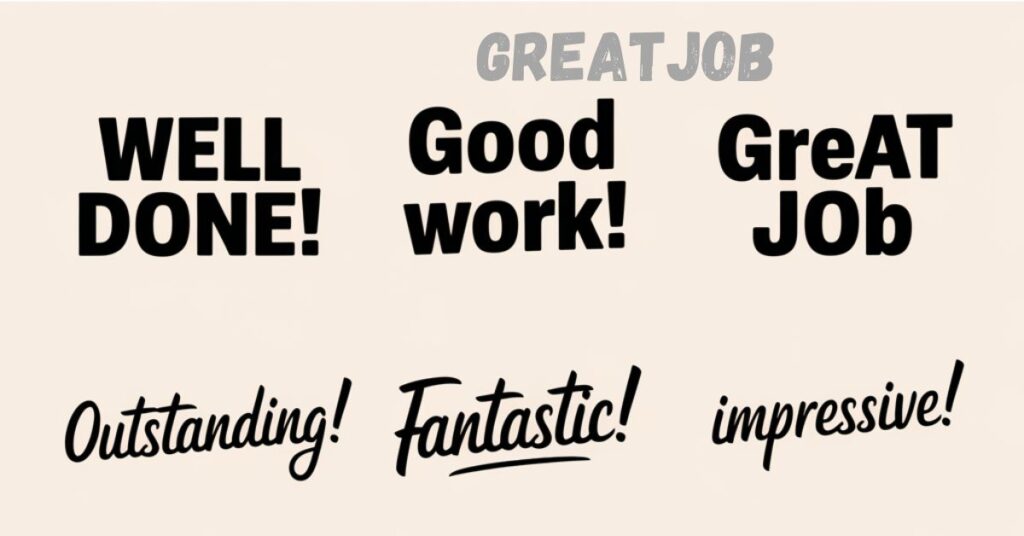In many professional and personal settings, offering positive feedback is essential for maintaining motivation and encouraging continued effort. However, using the exact phrase repeatedly, like saying “Great job!” can start to feel uninspired and impersonal.
This repetition can make your praise less effective and, over time, may diminish the impact of your feedback. To keep your recognition fresh and meaningful, exploring other ways to say “Great job” that convey your appreciation with genuine enthusiasm is crucial.
We will explore ten vibrant alternatives to “Great job,” along with examples, to help you express your praise more effectively and meaningfully.
Well Done! (Formal and Informal)

“Well done!” is a versatile expression that can be used in both formal and informal contexts. It’s particularly effective when acknowledging a specific task that has been completed successfully. This expression implies a sense of completion and satisfaction with the results.
Usage Examples:
- Professional Context: Imagine a team member completing a project ahead of schedule. You might say, “Well done on completing the project ahead of schedule; your dedication is truly commendable.”
- Casual Context: After a child completes a puzzle, you could smile and say, “That’s it! Well done!”
Emotional Impact:
Using “Well done!” fosters a sense of accomplishment, reinforcing the idea that the recipient’s efforts are recognized and valued. This can lead to increased motivation, making them more likely to strive for success in the future.
Excellent Work! (Formal)
“Excellent work!” is ideal for acknowledging efforts that not only meet but exceed expectations. This phrase conveys a high level of appreciation and is perfect for professional environments where detailed, quality output is recognized.
Usage Examples:
- Corporate Setting: After reviewing a well-crafted report, a supervisor might say, “John, excellent work on the financial analysis. Your insights were spot on.”
- Academic Setting: In an academic environment, a teacher might say to a student, “Sarah, excellent work on your science fair project; the judges were impressed by your thorough research.”
Value of Recognition:
Acknowledging excellence motivates individuals to maintain high standards in their work. This phrase can also serve as a benchmark, encouraging others to aspire to the same level of performance.
Great Job alternative Fantastic Effort! (Semi-formal)
“Fantastic effort!” focuses on the endeavor rather than the outcome, making it a great choice for situations where someone has tried exceptionally hard, even if the results are imperfect. It’s a supportive way to encourage continued effort and growth.
Usage Examples:
- Sports Coaching: After a tough match, a coach might say, “Fantastic effort out there, team. You all pushed yourselves to the limit.”
- Workplace: When a colleague stays late to help prepare for an important presentation, you could say, “Mia, that was a fantastic effort—thank you for your commitment.”
Encouragement Aspect:
This phrase highlights the importance of the effort rather than just the result. It’s particularly valuable in educational and developmental contexts, fostering resilience and a growth mindset.
Nicely Done! (Informal)
“Nicely done!” is a more casual expression, suitable for everyday achievements. It’s light and breezy, often used among friends or peers to acknowledge good performance on tasks or for small victories.
Usage Examples:
- Community Event: After a successful setup at a community bake sale, someone might say, “Nicely done, everyone! The stall looks inviting.”
- Cooking Class: In a cooking class, after a student successfully replicates a complicated recipe, the instructor might comment, “Ah, nicely done, Jenna! Your dish looks as good as it tastes.”
Lightheartedness:
Using “Nicely done!” adds a friendly touch to your feedback. It helps create a relaxed atmosphere, making it easier for people to accept praise and feel valued.
Outstanding Performance! (Formal)
“Outstanding performance!” is a strong, emphatic expression used to describe exceptionally high achievements. It’s often reserved for situations where individuals or teams exceed normal standards, particularly in artistic, academic, or professional fields.
Usage Examples:
- Corporate Recognition: The CEO might announce at a corporate awards ceremony, “Outstanding performance this year, Rachel. You’ve set new sales records!”
- Music Recital: After a flawless piano solo, the audience might whisper to each other, “What an outstanding performance!”
Significance of Recognition:
This phrase not only praises the recipient but also establishes a standard for excellence within the team or organization. Recognizing outstanding performance can inspire others to aim higher.
Impressive Work! (Formal)
“Impressive work!” is used when someone’s efforts genuinely impresses you, particularly in professional settings. This phrase is ideal for acknowledging creative solutions or diligent problem-solving.
Usage Examples:
- Marketing Pitch: After a successful marketing pitch, a client could say, “Impressive work—I think your campaign will resonate with our audience.”
- Academic Evaluation: After a student’s presentation, a professor might say, “Liam, impressive work on your thesis defense. Your arguments were well-formed and convincing.”
Value of Acknowledgment:
Using “Impressive work!” can significantly boost the morale of the recipient. It reinforces their strengths and capabilities, encouraging them to continue producing high-quality work.
You Nailed It! (Informal)OR Great JoB
“You nailed it!” is an informal, colloquial expression often used to convey that someone has performed a task perfectly or has met all the expectations with flying colors. It’s common in creative fields or informal settings where enthusiasm and casual praise are appreciated.
Usage Examples:
- Dance Workshop: After a perfect routine, the instructor might cheer, “You nailed it, Sophie! Exactly what I was looking for!”
- Prototype Demonstration: In a friendly project group, someone might say, “Dude, you nailed it with that design!”
ALSO READ THIS ARTICLE : 10 Other Ways to Say “Shut Your Mouth” (With Examples)
Superb Effort! (Formal)
“Superb effort!” clearly shows a high degree of approval for the endeavor and commitment displayed, focusing on the process rather than just the outcome. This expression is often used in personal development contexts and applies to professional tasks where the journey is as important as the result.
For instance:
- At a fundraising event, the organizer might say, “Superb effort by all volunteers; you made this a success!”
- In youth sports, when a young athlete competes in their first race and shows great determination, a parent might proudly say, “Superb effort, honey! You did incredibly well.”
Process-oriented Recognition:
Acknowledging the effort helps build a supportive environment where individuals feel encouraged to take risks and grow, knowing that their hard work is appreciated regardless of the outcome.
Kudos to You! (Informal to Semi-formal)
“Kudos to you!” is a way of giving praise that acknowledges someone’s achievement or effort. It’s derived from the Greek word for “praise” and can be used both personally and professionally.
Usage Examples:
- Workplace Acknowledgment: After a coworker successfully coordinates a complex project, you might say, “Kudos to you, Alex, for managing that seamlessly.”
- Community Newsletter: An article in a newsletter acknowledging staff contributions might begin, “Special kudos to you, Janet, for spearheading our community outreach initiatives.”
Cultural Relevance:
The phrase “Kudos to you!” is widely recognized and can fit various contexts, making it a flexible option for both informal and semi-formal situations.
Conclusion
Varying your praise can make a significant difference in how your feedback is received. For instance, the ten alternatives to “Great job!” provided here—Well done!, Excellent work!, Fantastic effort!, Nicely done!, Outstanding performance!, Impressive work!, You nailed it!, Superb effort!, Kudos to you!, and Remarkable achievement!—all carry unique connotations and emotional impacts.
Additionally, using these phrases can enhance your communication, foster a positive atmosphere, and motivate those around you. Therefore, the next time you want to acknowledge someone’s hard work or achievement, remember to mix it up.

“Robert Henry is an experienced blogger with a passion for language and education. His insightful posts on Vocab Scope offer readers valuable tips on vocabulary and grammar. With a background in linguistics and a knack for clear, engaging writing, Robert is dedicated to helping others enhance their communication skills.”






